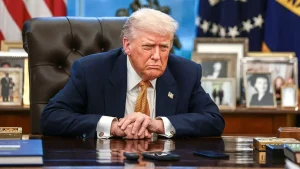The Potential Media Empire of a Father-Son Duo Close to Trump
In recent months, a fascinating story has been unfolding in the American media landscape, centered around a billionaire database entrepreneur and his ambitious son David. These two figures, who have cultivated a close relationship with former President Donald Trump, appear positioned to potentially control an unprecedented media empire spanning multiple major networks and platforms.
The father made his fortune in the database industry, building a technology business that eventually made him a billionaire. While his original wealth came from outside traditional media, he has been strategically expanding his influence into news and entertainment companies over recent years. His son David, following in his father’s footsteps, has become increasingly involved in these business ventures and has simultaneously fostered connections in political circles, particularly with Trump and his allies. These relationships have raised eyebrows across the media landscape, as industry observers note how political affiliations might influence future media ownership decisions.
What makes this situation particularly noteworthy is the scale of the potential media conglomerate that could emerge. According to reports, the family is positioning themselves to gain control over an astonishing collection of influential media properties including CBS, Paramount, Warner Bros., and CNN. This would represent an extraordinary concentration of media power, bringing together legacy broadcast networks, major film studios, and one of the most recognized names in cable news under a single family’s influence. The prospect has alarmed media diversity advocates who worry about the potential impact on independent journalism and the diversity of voices in American media.
Adding to this already remarkable portfolio is the family’s reported interest in acquiring a significant stake in TikTok, the enormously popular social media platform that has become a cultural phenomenon and news source for younger Americans. This digital expansion would give the family unprecedented reach across both traditional and new media, spanning multiple generations of consumers. The TikTok interest comes at a particularly sensitive time, as the platform faces ongoing scrutiny from regulators concerned about its Chinese ownership and potential national security implications. The Trump connection becomes especially relevant here, as the former president had previously attempted to force a sale or ban of TikTok during his administration.
Media industry analysts have noted that such a consolidation would represent a historic concentration of media influence in the hands of a single family with strong political leanings. Questions abound regarding how such ownership might affect editorial decisions, content creation, and the overall information ecosystem in America. While the family has not publicly detailed their specific plans for these properties, their close ties to Trump suggest the potential for a media empire that could be sympathetic to his political viewpoints and agenda. This has prompted discussions about media independence and the role of politically-aligned ownership in shaping public discourse.
As this situation continues to develop, the implications extend far beyond business headlines into questions about democracy, information quality, and media plurality. Regulatory bodies will likely scrutinize any major acquisitions carefully, weighing antitrust concerns against business interests. Meanwhile, journalists, creators, and executives at these media companies watch nervously, uncertain how new ownership might transform their organizations. What remains clear is that if this father-son duo succeeds in building their envisioned media empire, it would represent one of the most significant shifts in American media ownership in decades—with potential consequences for how news and entertainment reach millions of Americans every day.







